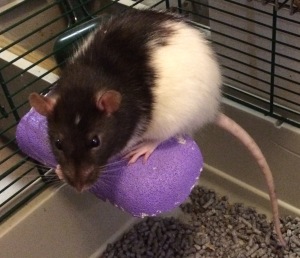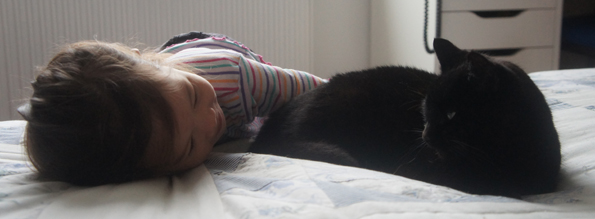Hey Meimei,
Sorry about Clio. It sounds like she was a lovely pet rat and it must have been a tough decision to have her euthanised. I’ll have to tell J and Little E about her – they’ll remember her from when their last visit to Australia.
When we first started this blog, you asked me once about introducing pets to kids. The Barn Owl and I have always thought it important for the kids to be kind to animals so we have always encouraged J and Little E to interact with animals (under supervision, of course) and they have even had the opportunity to keep siamese fighting fish last year.
Well, one of the very important things to remember about keeping pets, is that at some point kids (and parents, too) will have to deal with the eventual loss of their beloved pet.
Two years ago, the Outlaws also had to make the decision to euthanise their cat. Poppy, as she was known, was a wild cat that the Mother Outlaw tamed over the course of several months. Poppy had always been a rather anxious sort of cat, but as she got older she became increasingly more neurotic, often biting her own tail. The tip of the tail became infected, dripping blood and pus everywhere and would only heal after a course of antibiotics and sedatives. The sedatives made Poppy clumsy and she would fall over whilst walking around the house. Without the sedatives, Poppy would start attacking her tail again, reinfecting it.
Eventually, the vet told the Outlaws that Poppy was mentally stressed and that there was no other way to help her other than to amputate her tail and then keep her on sedatives for the rest of her life in order to prevent her from attacking the stump. The Outlaws then made the decision to have Poppy euthanised.
J and Little E had quite a good relationship with Poppy, who was surprisingly tolerant of them despite her skittish nature, allowing them to approach her and stroke her. Whenever we spoke with the Outlaws over Skype, the children would eagerly ask after Poppy who was quite often sitting near the computer on the bed or on the windowsill. Needless to say, when we got the news from the Outlaws, we knew that we had to let J and Little E know that Poppy had died.
Both the Barn Owl and I have had formal training in how to break bad news during our medical undergraduate days, so we employed some of these techniques with J and Little E – with some changes of course.
First, we prep the kids for the bad news by helping them to anticipate what is to come. We put on our most sombre expression and follow it up with a statement like, “Hey, Mummy and Daddy have something serious to tell you so can you come and sit with us in the study once you are done putting away your toys?”. This gives them a little bit of time to steel themselves emotionally.
Next, we choose a quiet, distraction-free place to talk to them. This means that we do not begin our discussion whilst in the car, in the playground or in front of the television. We turn our phones off so that there are no interruptions. We also make sure that the kids are in a safe and secure environment where they will feel comfortable expressing their thoughts and feelings. Usually this means that they are sitting in our lap or cradled in our arms.
When breaking bad news, go straight to the point and avoid using any euphemisms. It’s actually surprisingly difficult to say something as simple as “Poppy is dead.” People sometimes prefer to use terms like, “passed on” or “gone to a better place”. For children, those phrases can be confusing and obtuse, leading to awkward questions such as “Where did they pass on to?” and “Why aren’t we at this ‘better place’ as well?”.
Another thing that we do is that we tell the children the truth, in as much detail as they want to know. This seems a obvious thing to do but it is difficult to resist the urge to make the truth more palatable in order to avoid difficult questions, especially with regards to euthanising pets. Answer your child’s questions as directly as possible, keeping your answers clear and simple and avoiding the use of jargon.
The last thing that we do is to keep the communication channel open so that the kids can ask questions at any time. Kids do not always have an immediate or appropriate reaction to bad news and they take a lot longer to process information, especially emotionally loaded information. This means that your initial conversation may proceed like this:
Debs G: J, you remember Poppy the cat?
J: Yeah.
Debs G: Well, Poppy died.
J: Oh.
(silence)
Debs G: If you want to ask me anything about what happened, go ahead.
J: I have a question.
Debs G: Ok. What do you want to know?
J: Can I go and play with my blocks now?
Debs G: Yes.
This reaction may be surprising to adults, but it is no means an indication that the child is indifferent to the news nor that the conversation is over. If your child reacts in this manner, don’t press them for their thoughts and feelings or continue to repeat yourself in the hopes of eliciting a response (‘DEAD! I said it’s DEAD! Did you hear me?’). It may be necessary to give kids some space, maybe even some time alone while they think about the news. J actually came back to me about an hour later, wanting to talk more about Poppy, and this time he was very sad and tearful, wanting a hug and more information.



It is very good that you’ve both made this a serious conversation for the kids and teaching them rightly the level of importance of treating another living being with respect. haha N I love that response =) I am learning from your lessons!
Yes, it took all my willpower not to say, “OK, maybe you didn’t hear what I said, POPPY THE CAT IS DEAD. DEAD OK AREN’T YOU SAD HUH HUH.” It took about an hour or so for J to process that information. Longer for Little E.
This is wonderful! I totally agree, esp the bit about going straight to the point… the kids respond to that better! thanks for sharing and big hugs to your kids.
Definitely! Directness is the best way to communicate a complex idea.
Oh, I wish I had read this before Tudy (our pet bunny) died last year. I think hubs and I were so shocked ourselves when we found him lying motionless in his cage that I just burst into tears, and big D got pretty devastated. Lil D responded just like J, and I was quite frustrated that he wasn’t more sad about his pet, and kept trying to elicit a response from him, oops! 😦
Hope your sis is feeling better as the days go by…
Thanks Dotzy. And I’m sorry about Tudy. I remember reading about that on your blog. He was a such a sweet bunny.
Sorry to hear about the news… and thank you for sharing on how to break it to young children. It’s part and parcel of life, but it’s such a difficult topic to speak about even as adults. Hope the family is feeling better… take care!
Thanks. It’s always hard to lose something precious, be it to death or just a change in life circumstances.
Thanks for sharing the little tips with us and I am so sorry for your loss. 😦 i hope everyone is feeling a little better now..
Great post. enjoyed reading it. I believe in being honest with kids when it comes to death. The fishes in the fish tank come and go very often in our household, and my kids has taken the term death very well too. 😛
it really takes a lot of patience and skills in breaking bad news to kids. thanks for sharing on your own experience and tips.
Ai @ Sakura Haruka
There’s so much to learn about breaking news to children and many times we won’t know how they will react. I guess being up front and honest is a good option . Thanks for sharing
And that’s why I will not have a pet 😦 Simply too heartbreaking. The concept of death still takes a while for younger kids to grasp and register but I’m sure they will feel the absence and miss them.
Poor Poppy! I don’t have any children, (one day!) but thank you for this post on what would be a very difficult topic to broach with anyone, especially young children. You reacted well and in turn allowed your child to grieve appropriately.
Tegan xx – Permanent Procrastination
Yes, it wasn’t an easy decision for the Outlaws but it seemed like Poppy would just lead a life of perpetual suffering and misery otherwise. I’m glad you found the post helpful!
Pingback: Grief, Loss and Small Children (Part 2): Discussing Death | Owls Well
Pingback: Grief, Loss and Small Children (Part 3): Getting over loss and life changes | Owls Well